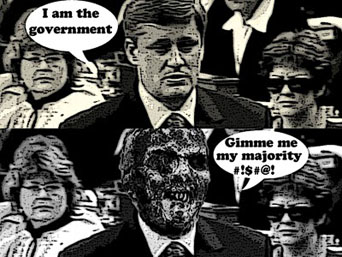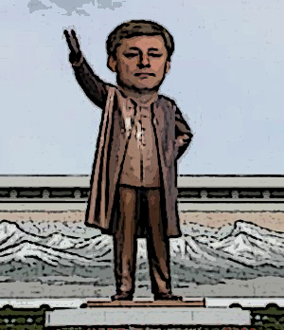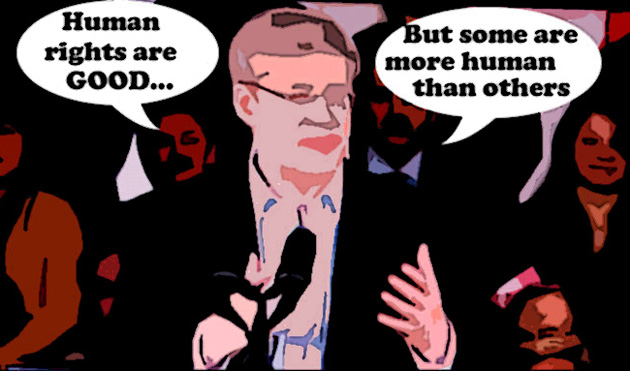The myth of the competent PM Harper .. and other campaign tales with two long weeks to go ..
Apr 17th, 2011 | By Citizen X | Category: In Brief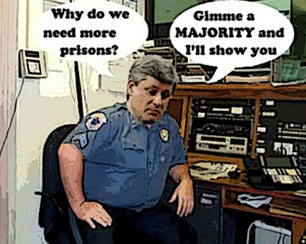
This obvious fabricated photo comes compliments of “Montreal Simon ... Fighting Cons, bigots, and bullies as hard as I can.”
Exactly one week ago I quoted the excellent Douglas Bell’s critical view of the 2011 Canadian federal election campaign: “my guess is that by the end of next week, the numbers will have changed dramatically.” It is now clear that, for the most part, this guess has proved plain wrong.
There are a few straws in the wind, for utterly resolute progressive optimists. In the Globe and Mail today, opinion poll analyst Éric Grenier is reporting that “Liberal and NDP gains dampen Tory hopes for majority three weeks in.” Another poll analyst, Bryan Breguet, has even constructed a possible (if not exactly likely) scenario under which the Conservatives could win only 126 seats on May 2 (down significantly from the 143 they won in 2008), compared with 112 for the Liberals, 27 for the New Democrats, and 43 for the Bloc Quebecois.
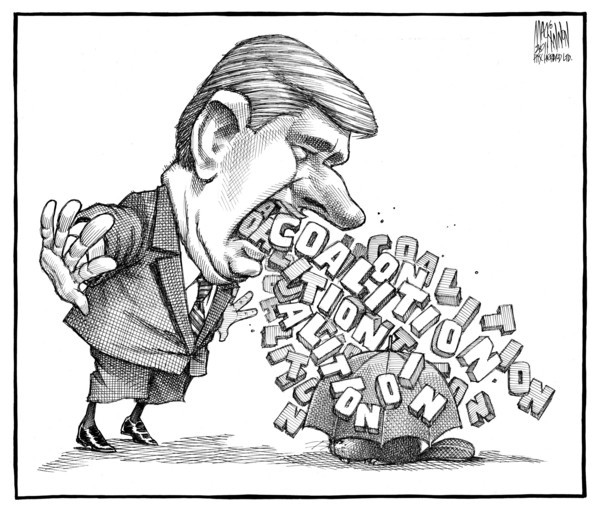
It could be that Mr. Harper will have created his own monster to eat his third minority government up in the very end? Or not of course!
If it ever did actually come to pass, some scenario of this sort could also open the door for one or another form of Liberal-NDP “Accord” (NOT “Coalition”) minority government, which could at some point soon enough take over from a third Harper Conservative minority government, unable to sustain democratic majority support in the new 41st Parliament of Canada.
Some similar scenario could work almost as well – maybe – if the Liberals had somewhat fewer and the New Democrats somewhat more seats. (Although of course if the Liberals have too many fewer seats than the Harper Conservatives, the optics would not be good, to say the very least.) And this prospect may help explain NDP guru Brian Topp’s speculation in the Globe and Mail this past Friday that the final result of the 2011 campaign on May 2 could prove “surprisingly surprising, and not in a bad way.”
Yet having said all this, the current most likely consensus forecast is that the Harper Conservatives will win just under the 155 seats that constitute a bare majority in the 308-member Canadian House of Commons – but still more than the 143 seats they won in 2008. (On this metric even Bryan Breguet is currently predicting 148 Conservative seats, compared with the 150 seats predicted by the “socially liberal and economically moderate … Election Watcher” at Canadian Election Watch, and Eric Grenier’s 152.)
Moreover, virtually all Conservative partisans are expecting a Conservative majority of some description. (Of seats in the House that is: even on current polls some 60% of the Canadian people still do not want any kind of Harper Government!) And there is no doubt still a better chance of that outcome than of Bryan Breguet’s extreme progressive optimist scenario of only 126 Conservative seats. The numbers on this front may still change over the next week or so, of course, but they certainly haven’t yet. And if and when they do, it could even be in the direction of a more likely Conservative majority, as Conservative partisans claim.
* * * *
If we do wind up with some form of Conservative majority of seats in the 41st Parliament, one ultimate blessing in disguise will almost certainly be the end of the carefully cultivated myth of Stephen Harper as a “competent” government manager. In this past Friday’s Globe and Mail Patrick Brethour rehearsed yet again this now well-worn contemporary Canadian political rhetoric (“Stephen Harper: nasty, brutish – and competent”).
You don’t have to google “Stephen Harper competent” very long to find strong arguments in the opposite direction. Consider a blogger called pogge this past January: “You keep using that word ‘competent’.” Or consult the parallel thoughts of BC businessman and Liberal candidate Dan Veniez, last September, in a piece called “The Tory Myth of the Competent Manager.”
My own opinion is that Stephen Harper can reasonably claim two main accomplishments in Canadian public life so far. The first is uniting the right wing of the political spectrum, in at least the anglophone parts of the country, through his new Conservative Party of Canada. The second is giving Western Canada, and especially the oil-rich province of Alberta, a long-overdue greater sense of participation in the federal government at Ottawa.
Beyond all this he strikes me as an essentially autocratic and lone-wolf political leader, who manages to achieve certain kinds of things, through implacable will power and plain old bullying. But where this style of leadership won’t work (and there are many such places in the short list of Canadian public policy problems today), he is at a loss. He also strikes me as an essentially mercurial personality, with a strong tendency to over-react in moments of crisis, and a troubling lack of judgment and ordinary common sense in routine matters of administration. (It scares me when I see the commercials of him at his desk, working late into the night, when one’s solitary thoughts are often quite confused!)
Quite apart from his gross insensitivity to Canada’s democratic political culture (which I personally agree has become appallingly palpable over the past five years – even if some among us mistake all this for some kind of sign of strength, as in the case, eg, of Dick Cheney down south), it is Mr. Harper’s recurrent wild mood swings and accompanying episodes of astounding incompetence – that continue to concern me most, when I think about the prospects of a Harper majority government, undisciplined by the need to listen to more sensible people than John Baird or Vic Toews in the Canadian House of Commons. (And the fall and early winter of 2008 is only the most utterly astounding case in point.)
The ultimate honest response of Mr. Harper’s most earnest and fair-minded supporters to such concerns (after several drinks at your surviving local old-style Canadian draft hall, in the spirit of Ralph Klein) seems to be that his majority government, even if it does come to pass, will only remain in office for four years. (In this case he will have to obey his own fixed-election-date law, unlike in 2008.) But to me that only makes things worse. It is almost enough to make a person like me go back to my long-abandoned Sunday school textbooks – in search of advice on how to pray so that the Great Manitou of Canada will finally answer your prayers.
